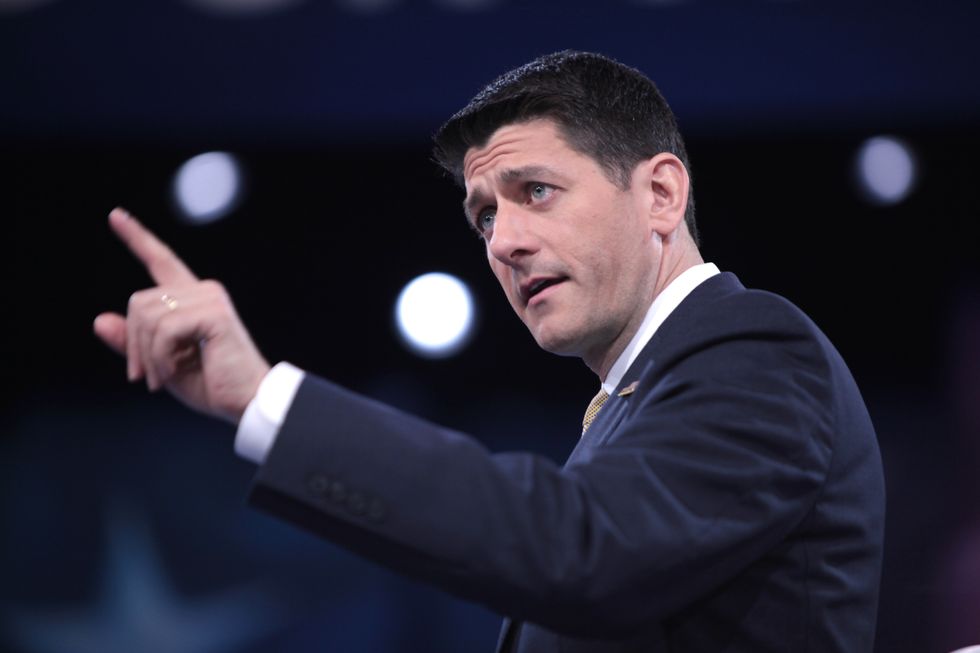Since President Donald J. Trump's ascendancy to the Oval Office in 2017, Capitol Hill has seen a number of key Republicans resign or announce that they won't be seeking reelection in 2018 from both the Senate and the House of Representatives.
Among the lot includes Rep. Jason Chaffetz (R-UT), the former Chair of the House Oversight Committee; Rep. Trey Gowdy (R-SC), the former Chair of the House Benghazi Committee and Chaffetz's successor at the House Oversight Committee; as well Orin Hatch (R-UT), the President Pro Tempore of the Senate and the longest-serving Republican Senator in US Senate-history. Last week saw the announcement of the end of the road for another key Republican member of Congress: Speaker of the House Paul Ryan (R-WI).
Ever since Politico's Tim Albert's reports that in interviews with “three dozen people who know the speaker — fellow lawmakers, congressional and administration aides, conservative intellectuals and Republican lobbyists — not a single person believed Ryan will stay in Congress past 2018.” In March of 2018, Rep. Mark Amodei (R-NV), who isn't known to be all that close to Ryan, let a rumor leak to the press corp that the Speaker was on his way out. Speaker Ryan has continuously and publicly dismissed these claims as nothing but rumors and "rank speculation" until now.
When Ryan took over the post of Speaker following John Boehner's (R-OH) retirement in late-2015, his ascendency was meant to usher in a new era of Republican politics, unified behind the Obamacare repeal and replace increased tax cuts, and dismantling the welfare state established by the Democratic Administration. Instead, Ryan ended up with a president who has no interest in his agenda, or in the many cases such as immigration, trade, and entitlement reform, has no interest or concern for the party's agenda.
At the start of Trump's presidency, Congressional Republicans put forth an ambitious agenda, having gained control over both chambers of Congress as well as the White House. They sought to repeal and replace Obamacare, implement a major budget deal and enact significant tax cuts.
Unfortunately for Republicans, the crusade that is the Obamacare repeal failed. They managed to pass tax cuts, but Republican members of Congress are already worried the bill won’t be popular enough in November to provide them with the edge to help them win elections in 2018. Meanwhile, Trump, who doesn’t seem interested in talking taxes nearly as much as his colleagues on Capitol Hil, is stuck on the one policy issue that was never truly been at the forefront of modern American politics and seemingly will only deepen party divides: immigration.
From what he has stated, if it were up to Paul Ryan to lead the direction of the Republicans, the party would steer clear of the topic of immigration, as it would do little but divide the two parties and in-turn make other, more important pieces of legislation even harder to achieve bipartisan agreement on.
From "build the wall" to "bad hombres," Trump's radical stance on immigration played a big part in getting him elected in the first place. Consequently, Congressional Republicans have had no choice but to follow suit, as this seemed to be the direction conservative Americans, their constituents, wished to head. Immigration, however, is among Ryan’s biggest political vulnerabilities in the "Trump-approach" to Republican politics. His own views often said to have been shaped by his mentor Jack Kemp (a pro-immigration New York Republican whom Ryan worked for early in his career and with whom he remained close until Kemp’s death in 2009), are in stark contrast to the hardliner views enforced by the President.
While failing to meet his as well as his party's set agenda as Speaker of the House, Ryan has also been met with incredibly strong criticism by the far-right for his apparent hesitation when it comes to Trump's radical immigration policies.
In July of 2016, long before confirmed reports of Ryan's resignation came to light, known white supremacist contender for Ryan's seat, Paul Nehlen (R), showed up at the Speaker's personal home in Janesville, Wisconsin, with a convoy of four mothers who had lost their children "at the hands of immigrants." Nehlen is seeking Ryan's seat in the upcoming elections as well.
Additionally, Breitbart News, the far-right media outlet formerly run by Trump's former adviser Steve Bannon, has gone on the assault in regards to Ryan. Breitbart articles, since Ryan took over the speakership, have stated that Ryan is no different from a “mass amnesty” Democrat. “Speaker Paul Ryan goes silent as Refugee program claims victims at Ohio,” and “GOP Rep: Paul Ryan’s immigration policy not ‘in best interest of America." They have accused Ryan of having an “expansionist immigration agenda.”
Since Trump first ascended to the Presidency, Ryan has just managed to keep the Republican Party afloat. Trump threatened to shut down the government over Republican leaders’ latest policy push: the spending bill, which was largely considered to be the last major agenda-based policy fight of the 2018 Congressional year. As the party vies to push forward with its agenda, the President seems intent on picking at old wounds: the failed attempt to resolve the "immigration crisis" in Congress.
With Democrats determined to win back the majority in the House of Representatives in the midterm election cycle, the only way for Republicans to retain their power is through unity, something the President doesn't seem too interested in. Given this, alongside 25 House Republicans and three of their Senators, it's only logical that Speaker of the House Paul D. Ryan is ready to depart from Capitol Hill.

















